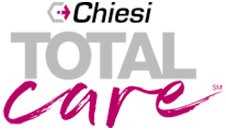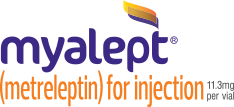


The Chiesi Total Care support program and its dedicated team provide your patients taking Myalept helpful support services and resources, including personalized nutrition consultation, education, support, and guidance to help support the care you provide.
GL and Myalept Education and Support
A dedicated team can provide your patient one-on-one education about GL and Myalept. They are here to support your patient for the duration of their treatment to help them stay on track, supporting your treatment plan for them.
Personalized Nutrition Consultations
A nutrition program was developed by dietitians with expertise in GL to help support your care with a healthy eating plan specifically for your GL patient.
Insurance support
Contact a Chiesi Total Care Coordinator to help verify your patients’ insurance coverage and walk you through the prior authorization and appeals process.
Co-pay assistancea,b
Help your commercially insured eligible patients obtain 100% coverage of their monthly out-of-pocket costs (up to an annual maximum) for Myalept regardless of their financial status and whether they are new to Myalept or already on therapy. There are no income requirements.
Free drug assistancea
Help your eligible patients access Myalept for free if they are uninsured or underinsured (e.g., have reached their insurance cap or have insurance that will not cover their Myalept treatment).c

a)Applicants with federal and state government insurance such as Medicare, Medicaid, VA/DoD, and TRICARE are not eligible.
b) This program is operated by Chiesi, Inc. and can be modified at any time without notice.
c) Subject to other eligibility criteria
Injection training and adherence support
Start your patients off right with Myalept by using a registered nurse to provide injection training at no cost. Keep your patients motivated to stay on track with refill reminders and helpful tips for staying on therapy.
Myalept fulfillment support
Utilize key pharmacy services to fulfill your patient’s prescription such as direct-to-patient medication and supplies shipments, Myalept refills and replacement, and a 24/7 pharmacist and nurse hotline.

INDICATION: MYALEPT® (metreleptin) for injection is a leptin analog indicated as an adjunct to diet as replacement therapy to treat the complications of leptin deficiency in patients with congenital or acquired generalized lipodystrophy.
LIMITATIONS OF USE: The safety and effectiveness of MYALEPT for the treatment of complications of partial lipodystrophy or for the treatment of liver disease, including nonalcoholic steatohepatitis (NASH), have not been established.
MYALEPT is not indicated for use in patients with HIV-related lipodystrophy. MYALEPT is not indicated for use in patients with metabolic disease, including diabetes mellitus and hypertriglyceridemia, without concurrent evidence of generalized lipodystrophy.
WARNING: RISK OF ANTI-METRELEPTIN ANTIBODIES WITH NEUTRALIZING ACTIVITY AND RISK OF LYMPHOMA
Anti-metreleptin antibodies with neutralizing activity have been identified in patients treated with MYALEPT. The consequences of these neutralizing antibodies are not well characterized but could include inhibition of endogenous leptin action and/or loss of MYALEPT efficacy. Severe infection and/or worsening metabolic control have been reported. Test for anti-metreleptin antibodies with neutralizing activity in patients who develop severe infections or show signs suspicious for loss of MYALEPT efficacy during treatment. Contact Chiesi Farmaceutici S.p.A. at 1-866-216-1526 for neutralizing antibody testing of clinical samples.
T-cell lymphoma has been reported in patients with acquired generalized lipodystrophy, both treated and not treated with MYALEPT. Carefully consider the benefits and risks of treatment with MYALEPT in patients with significant hematologic abnormalities and/or acquired generalized lipodystrophy.
Because of these risks associated with the development of anti-metreleptin antibodies that neutralize endogenous leptin and/or MYALEPT and the risk for lymphoma, MYALEPT is available only through a restricted program under a Risk Evaluation and Mitigation Strategy (REMS) called the MYALEPT REMS PROGRAM.
CONTRAINDICATIONS: MYALEPT is contraindicated in general obesity not associated with congenital leptin deficiency. MYALEPT has not been shown to be effective in treating general obesity. The development of anti-metreleptin neutralizing antibodies have been reported in obese patients treated with MYALEPT. MYALEPT is contraindicated in patients with prior severe hypersensitivity reactions to metreleptin or to any of its components.
WARNINGS AND PRECAUTIONS: A dose adjustment, including possible large reductions, of insulin or insulin secretagogue may be necessary in some patients to minimize risk of hypoglycemia. Closely monitor blood glucose in patients on concomitant insulin, especially those on high doses, or insulin secretagogue.
Cases of progression of autoimmune hepatitis and membranoproliferative glomerulonephritis (associated with massive proteinuria and renal failure) were observed in some patients with acquired generalized lipodystrophy treated with MYALEPT. A causal relationship between MYALEPT and the development and/or progression of autoimmune disease has not been established. Carefully consider the benefits and risks of MYALEPT treatment in patients with autoimmune disease.
Hypersensitivity reactions (eg, anaphylaxis, urticaria or generalized rash) have been reported. Patient should promptly seek medical advice about discontinuation of MYALEPT if a hypersensitivity reaction occurs.
MYALEPT contains benzyl alcohol when reconstituted with Bacteriostatic Water for Injection. The preservative benzyl alcohol has been associated with serious adverse events and death in pediatric patients, particularly in neonates and premature infants. Preservative-free Water for Injection is recommended for use in neonates and infants.
ADVERSE REACTIONS: Most common adverse reactions (≥10%) in clinical trials were headache, hypoglycemia, decreased weight, and abdominal pain.
Please see full Prescribing Information, including Boxed Warning.
INDICATION: MYALEPT® (metreleptin) for injection is a leptin analog indicated as an adjunct to diet as replacement therapy to treat the complications of leptin deficiency in patients with congenital or acquired generalized lipodystrophy.
LIMITATIONS OF USE: The safety and effectiveness of MYALEPT for the treatment of complications of partial lipodystrophy or for the treatment of liver disease, including nonalcoholic steatohepatitis (NASH), have not been established.
MYALEPT is not indicated for use in patients with HIV-related lipodystrophy. MYALEPT is not indicated for use in patients with metabolic disease, including diabetes mellitus and hypertriglyceridemia, without concurrent evidence of generalized lipodystrophy.
WARNING: RISK OF ANTI-METRELEPTIN ANTIBODIES WITH NEUTRALIZING ACTIVITY AND RISK OF LYMPHOMA
Anti-metreleptin antibodies with neutralizing activity have been identified in patients treated with MYALEPT. The consequences of these neutralizing antibodies are not well characterized but could include inhibition of endogenous leptin action and/or loss of MYALEPT efficacy. Severe infection and/or worsening metabolic control have been reported. Test for anti-metreleptin antibodies with neutralizing activity in patients who develop severe infections or show signs suspicious for loss of MYALEPT efficacy during treatment. Contact Chiesi Farmaceutici S.p.A. at 1-866-216-1526 for neutralizing antibody testing of clinical samples.
T-cell lymphoma has been reported in patients with acquired generalized lipodystrophy, both treated and not treated with MYALEPT. Carefully consider the benefits and risks of treatment with MYALEPT in patients with significant hematologic abnormalities and/or acquired generalized lipodystrophy.
Because of these risks associated with the development of anti-metreleptin antibodies that neutralize endogenous leptin and/or MYALEPT and the risk for lymphoma, MYALEPT is available only through a restricted program under a Risk Evaluation and Mitigation Strategy (REMS) called the MYALEPT REMS PROGRAM.
CONTRAINDICATIONS: MYALEPT is contraindicated in general obesity not associated with congenital leptin deficiency. MYALEPT has not been shown to be effective in treating general obesity. The development of anti-metreleptin neutralizing antibodies have been reported in obese patients treated with MYALEPT. MYALEPT is contraindicated in patients with prior severe hypersensitivity reactions to metreleptin or to any of its components.
WARNINGS AND PRECAUTIONS: A dose adjustment, including possible large reductions, of insulin or insulin secretagogue may be necessary in some patients to minimize risk of hypoglycemia. Closely monitor blood glucose in patients on concomitant insulin, especially those on high doses, or insulin secretagogue.
Cases of progression of autoimmune hepatitis and membranoproliferative glomerulonephritis (associated with massive proteinuria and renal failure) were observed in some patients with acquired generalized lipodystrophy treated with MYALEPT. A causal relationship between MYALEPT and the development and/or progression of autoimmune disease has not been established. Carefully consider the benefits and risks of MYALEPT treatment in patients with autoimmune disease.
Hypersensitivity reactions (eg, anaphylaxis, urticaria or generalized rash) have been reported. Patient should promptly seek medical advice about discontinuation of MYALEPT if a hypersensitivity reaction occurs.
MYALEPT contains benzyl alcohol when reconstituted with Bacteriostatic Water for Injection. The preservative benzyl alcohol has been associated with serious adverse events and death in pediatric patients, particularly in neonates and premature infants. Preservative-free Water for Injection is recommended for use in neonates and infants.
ADVERSE REACTIONS: Most common adverse reactions (≥10%) in clinical trials were headache, hypoglycemia, decreased weight, and abdominal pain.


